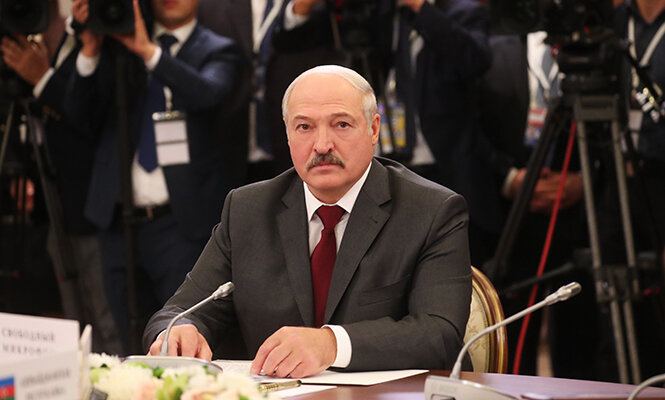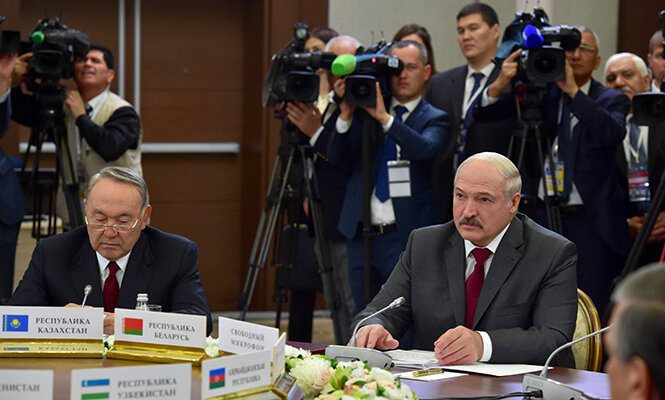CIS Heads of State Council session
- 19
Statements saying that the Commonwealth of Independent States is needed should be backed by concrete actions, primarily in the economic sphere. Belarus President Aleksandr Lukashenko said during the narrow-format session of the CIS Heads of State Council in Sochi on 11 October.
Aleksandr Lukashenko reminded that it has been one year since the session of the CIS Heads of State in Bishkek decided in favor of adapting the CIS to modern reality. The document adopted by the Bishkek session contains clear instructions on developing and bolstering the Commonwealth of Independent States. Back then the leaders of all the countries agreed that the organization should be preserved. “But we have failed to make any headway. The statement that the Commonwealth of Independent States is needed should be backed by concrete actions,” the President said.
He pointed out that virtually every regional association aims to open markets and enable equal business operation terms. “We have a good foundation to make it happen — the free trade zone agreement. In line with the document enabling equal terms of access to government procurement contracts is one of the next steps. Last year five countries signed the protocol on rules and procedures of regulating government procurement contracts. Work is in progress to implement the document. The heads of state of Kazakhstan, Moldova, and Ukraine have not signed this document. It means that once again we will face exemptions,” Aleksandr Lukashenko stated. “On the one hand, we talk about open trade. On the other hand, we prevent each other from accessing government procurement contracts, which make up a large part of the market.”
Enabling free trade in services is another matter entirely. “Everyone knows perfectly well that work on the relevant agreement is in progress. Experts get together, take the old text, shuffle the paragraphs, and forward the document for consideration. The situation is repeated two or three months later. Things have been going on like that for years. The project has no coordinator while the CIS Executive Committee is not up to the task, frankly speaking,” stressed the Belarusian leader.
The head of state urged participants of the session to pay close attention to these problems because trade and economy represent the foundation of any relations. “Real advances in the two spheres I’ve mentioned will reinvigorate the CIS. Otherwise, the CIS will remain nothing but good intentions. We should give the relevant instructions to our governments so that these matters would be reviewed,” the Belarus President said.

Aleksandr Lukashenko also criticized the CIS Interparliamentary Assembly for low efficiency. He said that he had already had an opportunity share opinions about the operation of certain CIS bodies, in particular, the Interparliamentary Assembly, with Kazakhstan President Nursultan Nazarbayev. They believe that this agency is not efficient enough despite it receives sufficient financing.
“Maybe we should give up on this structure if it does not work. Although we suggested giving concrete powers to it. We pass certain model laws, but none of them, for example, in Belarus formed the basis of the national legislation. It never happened, in fact,” the Belarusian leader said.
“It turns out that MPs gather together in St. Petersburg to discuss something. But we even do not know anything about it because it is not in demand,” Aleksandr Lukashenko remarked. “There are a lot of civil servants, but their work is inefficient.”
The President emphasized that these issues should be thoroughly analyzed. Even not the most topical and urgent issues are discussed at the level of the heads of state. “Sincerely speaking, even at the top-level summits we make decisions and not always implement them,” Aleksandr Lukashenko said.
In his opinion, trade and economic interaction and security issues are more important, and the Belarusian side has raised them several times. “Security matters are of paramount importance. But we still neglect them either because we are afraid to raise them or realize that we will not be able to solve them,” the Belarusian leader said.

“We pretend that everything is good. We gather together, make statements, but the efficiency of this work is very low. Maybe we should appoint certain specialists who would propose a serious reform or reorganization of our activities, shouldn’t we?” the President asked.
Similar problems exist in the EAEU as well, he said. But there is a more concrete agenda and more concrete decisions because the union is very important. “I would agree that we should have a parliamentary dimension in the EAEU because we need to discuss a lot of things there. We should energize our post-Soviet structures,” Aleksandr Lukashenko said. He expressed confidence that other heads of state will support him.
During the session the CIS heads of state adopted the statement in support of the institution of family and traditional family values.
The CIS leaders took note of the importance to elaborate social and economic measures aimed at the development of favorable conditions for the creation of the family, the protection of mother and child health, the development of the institute of adoption, the support to young parents, and care about the senior generation.
The presidents emphasized the need for cooperation in addressing the issues related to the infringement of children’s rights and crimes against children. The document also speaks about the support of the international community in ensuring the gender equality and maintaining balance between work and family.

Russia, as a country presiding in the CIS, should submit the text of the statement to the UN, the OSCE and other international organizations.
Decisions to deepen cooperation in the fight against terrorism and corruption were passed at the session.
The presidents approved the concept of cooperation in counteracting
legalization (laundering) of ill-gotten proceeds and financing of terrorism and
proliferation of mass destruction. It defines the principles and objectives,
areas and forms, information and scientific cooperation in these areas.
The
leaders also approved the concept of cooperation in combating corruption, which
was developed in furtherance of the interstate program of joint measures to
combat crime for 2014-2018. The document has been adopted for further systemic
development of interaction and ensuring coordinated action in this field and
aims to develop the legal and institutional frameworks. It also defines the
principles, objectives and tasks, main areas and forms of cooperation,
information and scientific support of the joint work.
During the session the CIS heads of state also approved other documents on legal matters. For example, the presidents endorsed the agreement to deploy in Russia the office for coordination of the fight against organized crime and other dangerous crimes in the CIS, the protocol on the transfer of drug drugs, psychotropic substances and their precursors, firearms, ammunition, explosives and explosive devices that are material evidence in criminal cases.

A decision to create a unified system of airspace defense in the CIS by 2025 was made. The work in this field will be organized in accordance with the presidents’ guidelines to adapt the unified system of air defense to the resolution of airspace defense tasks.
The CIS Heads of State Council adopted a decision to separate the authorities with the CIS Heads of Government Council at the summit in Sochi.
The presidents will now be in charge of determining the strategy and areas of further development of the CIS, the cooperation in the defense policy, the protection of the external borders, crime prevention, counteraction to terrorism and other challenges and threats.
The CIS leaders will be able to delegate their powers to the heads of government, ministers of foreign affairs and the CIS Economic Council, defense ministers, commanders of the border troops.
In this respect new provisions were approved on the CIS Foreign Ministers Council, the CIS Economic Council, and the CIS Defense Ministers Council.





































